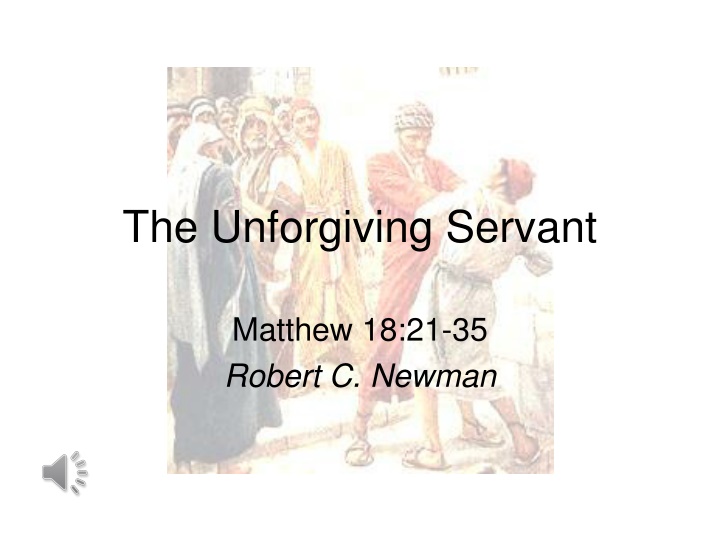
Forgiveness According to Matthew 18:21-35
Explore the powerful teachings of forgiveness in Matthew 18:21-35, reflecting on the importance of being forgiving in the face of challenges and reflecting on the consequences of harboring unforgiveness.
Download Presentation

Please find below an Image/Link to download the presentation.
The content on the website is provided AS IS for your information and personal use only. It may not be sold, licensed, or shared on other websites without obtaining consent from the author. If you encounter any issues during the download, it is possible that the publisher has removed the file from their server.
You are allowed to download the files provided on this website for personal or commercial use, subject to the condition that they are used lawfully. All files are the property of their respective owners.
The content on the website is provided AS IS for your information and personal use only. It may not be sold, licensed, or shared on other websites without obtaining consent from the author.
E N D
Presentation Transcript
The Unforgiving Servant Matthew 18:21-35 Robert C. Newman
Revenge is a major feature in the lives of many. a strong temptation for all of us. It is hard to forgive when someone has done something really nasty to us! But Jesus requires his followers to be forgiving. This is not an option! Consider Jesus' story in Matthew 18.
Matthew 18:21-35 (1) 21 (NIV) Then Peter came to Jesus and asked, "Lord, how many times shall I forgive my brother when he sins against me? Up to seven times?" 22 Jesus answered, "I tell you, not seven times, but seventy-seven times. 23 Therefore, the kingdom of heaven is like a king who wanted to settle accounts with his servants. 24 As he began the settlement, a man who owed him ten thousand talents [millions of dollars] was brought to him. 25 Since he was not able to pay, the master ordered that he and his wife and his child- ren and all that he had be sold to repay the debt. 26 The servant fell on his knees before him. 'Be patient with me,' he begged, 'and I will pay back everything.' 27 The servant's master took pity on him, canceled the debt and let him go.
Matthew 18:21-35 (2) 28 (NIV) "But when that servant went out, he found one of his fellow servants who owed him a hundred denarii [a few dol- lars]. He grabbed him and began to choke him. 'Pay back what you owe me!' he demanded. 29 His fellow servant fell to his knees and begged him, 'Be patient with me, and I will pay you back.' 30 But he refused. Instead, he went off and had the man thrown into prison until he could pay the debt. 31 When the other servants saw what had happened, they were greatly distressed and went and told their master everything that had happened. 32 Then the master called the servant in. 'You wicked servant,' he said, 'I canceled all that debt of yours because you begged me to. 33 Shouldn't you have had mercy on your fellow servant just as I had on you?'
Matthew 18:21-35 (3) 34 "In anger his master turned him over to the jailers to be tortured, until he should pay back all he owed. 35 This is how my heavenly Father will treat each of you unless you forgive your brother from your heart."
The Context Jesus has just been teaching on how Christians are to deal with other believers who have sinned against them. Peter wants to know how many times we should forgive a brother. This probably assumes repentance; compare Luke 17:4, where Jesus says, If he repents, forgive him.
The Context Peter probably feels generous in suggesting seven times, as the rabbis recommended limiting forgiveness to three times. Jesus' response is best understood as saying our forgiveness should be unlimited rather than that we should keep careful accounts. He justifies his answer with this story.
The Story A king is settling accounts with his 'servants.' The size of the fellow's debt (10,000 talents) indicates that he is a high-level official in the royal bureaucracy. One talent = 60-75 lb of silver (25-30 Kg) According to Josephus (Ant 12.175), the annual tax revenue of Palestine was 8,000 talents.
The Story Sell fellow & family into slavery: mainly punishment or revenge, since the top price for a slave would have been about one talent, for most slaves, less than 1/10 of this. Fellow's plea: be patient & I'll repay Unbelievable! King Herod's annual income 900 talents. For a common day-laborer, this would be 60 million days' wages, ~200,000 years! But the king has pity and forgives.
The Story Fellow's response to 100 denarii debt: Not insignificant debt 100 days' wages, some thousands of $$ Servant's plea: be patient & I'll repay Not unreasonable Fellow won't wait, throws him into prison Other servants distressed, report this to the king
The Story King becomes angry: Since I cancelled your debt, you should have cancelled his Turns him over to torturers until debt is paid (i.e., never) The stinger: So shall my heavenly Father do to you if you don't each forgive your brother from your heart!
Its Significance If we are really Christians, we have been forgiven an astronomical load of sin by God, against whom all our sins are really committed. We are obligated to forgive others when they repent, no matter how many times they seek it, because their worst sins against us are almost nothing compared to our sins against God.
Its Significance Though (as appears elsewhere) God will not cancel forgiveness he has actually given, if we are unforgiving people we show that we have not really received forgiveness from God. May God give us grace to forgive those who sin against us!
